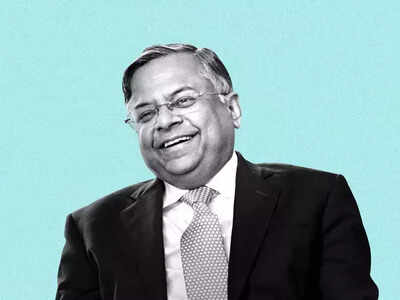
Every student choosing their degree wonders: will this lead to real success? The answer lies in examining India's most powerful business leaders, whose educational journeys reveal surprising patterns about how academic choices translate into corporate leadership.From engineering graduates running financial empires to commerce students building technology giants, India's top CEOs demonstrate that success stems from combining solid educational foundations with strategic career pivots. Their stories offer valuable insights for students navigating today's competitive landscape, showing how different academic paths can lead to extraordinary achievements.
Natarajan Chandrasekaran - Tata Sons Chairman
Chandrasekaran began his education in a Tamil medium government school in Mohanur before pursuing Applied Sciences from Coimbatore Institute of Technology and completing his MCA from NIT Tiruchirappalli.
Without an IIT or IIM pedigree, he now leads India's largest conglomerate worth over $100 billion. His technical foundation positioned him perfectly for India's technology boom.
Rajesh Gopinathan - Former TCS CEO
Gopinathan studied electrical engineering at NIT Tiruchirappalli before earning his PGDM from IIM Ahmedabad. This combination of technical depth and management expertise created the ideal foundation for leading one of the world's largest IT services companies through digital transformation.
Kiran Mazumdar-Shaw - Biocon Founder
After studying zoology at Bangalore University, Mazumdar-Shaw pursued a Master Brewer degree from Ballarat College, Australia. Her unconventional brewing background became her competitive advantage when founding Biocon. The fermentation expertise proved essential in biotechnology manufacturing, creating unique advantages in an emerging industry.
Sanjiv Mehta - Former Hindustan Unilever CEO
Mehta qualified as a Chartered Accountant before completing Harvard's Advanced Management Programme.
His CA training provided crucial financial analysis skills during crisis management and throughout his international career spanning Bangladesh, Philippines, and Africa.
Aditya Puri - Former HDFC Bank CEO
Puri earned his commerce degree from Punjab University before qualifying as a Chartered Accountant. This combination enabled him to build HDFC Bank into India's most valuable private sector bank. His systematic approach to risk management helped navigate multiple economic cycles.
Uday Kotak - Kotak Mahindra Bank CEO
Kotak completed his commerce degree from Sydenham College before pursuing Management Studies at Jamnalal Bajaj Institute. Starting with just ₹3 lakh in 1985, he leveraged his foundational business education to build one of India's leading financial institutions.
What can students learn from their journeys?
These leaders prove 3 critical principles that challenge conventional wisdom:Excellence transcends institutional prestige: Chandrasekaran and Gopinathan attended regional colleges, not IITs, yet became industry titans.
Academic excellence and practical application often matter more than brand names.Unconventional paths create advantages: Mazumdar-Shaw's brewing background initially seemed limiting but provided unique expertise for biotechnology entrepreneurship. Students shouldn't fear unusual academic combinations if they align with emerging opportunities.Professional qualifications drive mobility: Mehta and Puri show how chartered accountancy provides transferable skills valuable across industries and geographies, offering analytical frameworks crucial for business leadership.
For today's students, the education backgrounds of these CEOs provides key insights for success. Focus on building transferable skills like analytical thinking and strategic reasoning. Choose programs that develop these capabilities, whether through engineering, commerce, or professional qualifications. Success depends more on how you leverage your education than the specific institution you attend.

 18 hours ago
39
18 hours ago
39




























 English (US)
English (US)